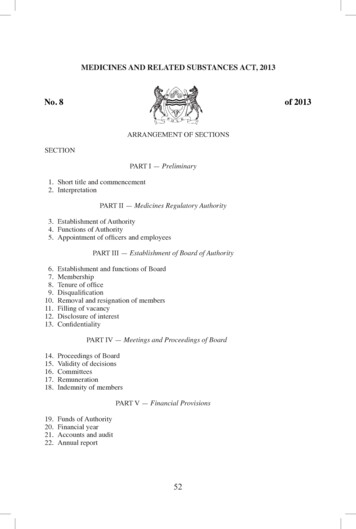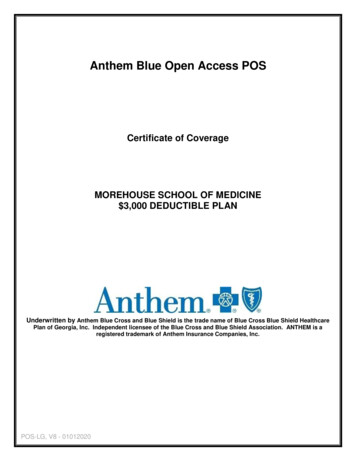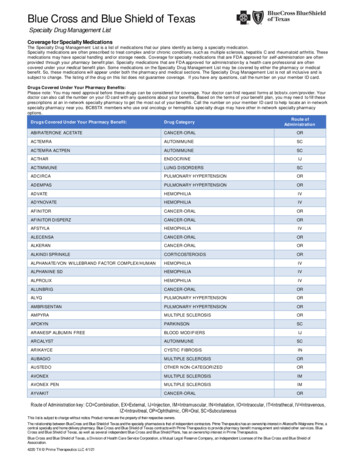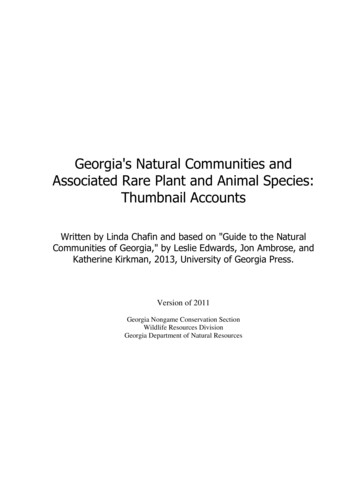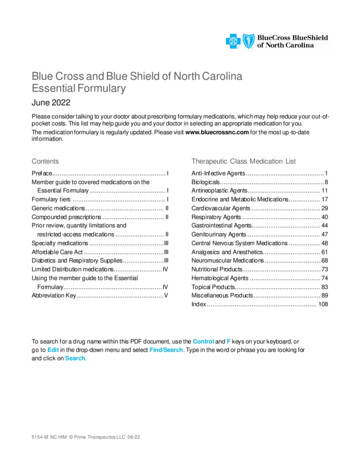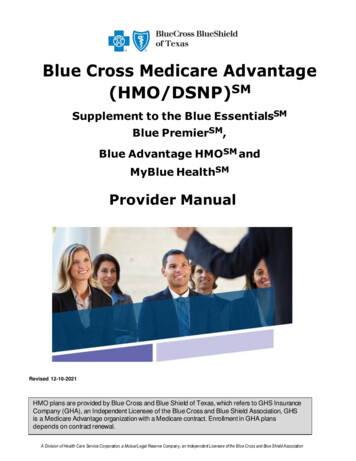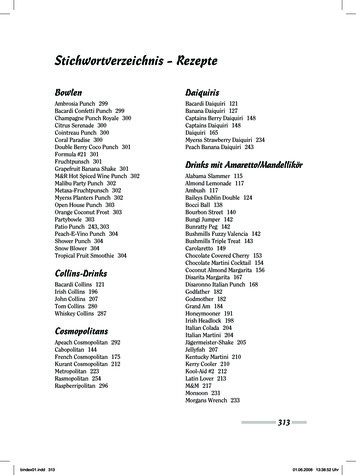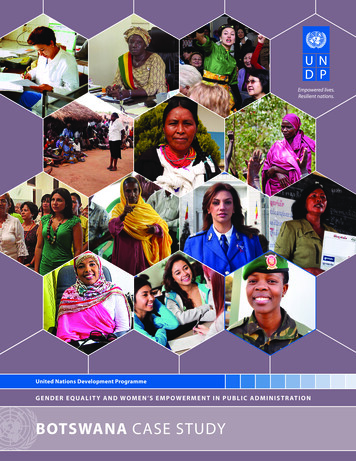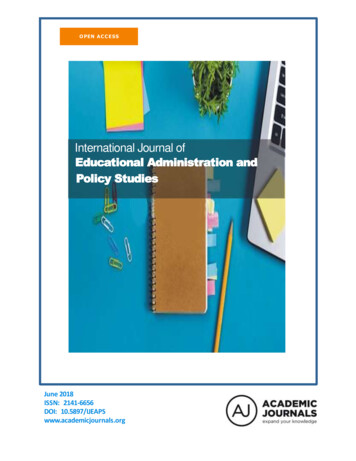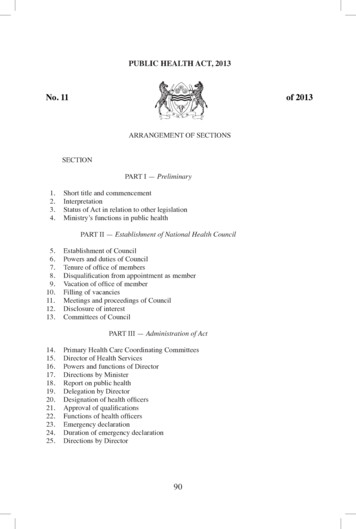
Transcription
90BLUE BOOKBOOK -- BOTSWANABOTSWANABLUEPUBLIC HEALTH ACT, 2013No. 11of 2013ARRANGEMENT OF SECTIONSSECTIONPART I — Preliminary1.2.3.4.Short title and commencementInterpretationStatus of Act in relation to other legislationMinistry’s functions in public healthPART II — Establishment of National Health Council5.6.7.8.9.10.11.12.13.Establishment of CouncilPowers and duties of CouncilTenure of office of membersDisqualification from appointment as memberVacation of office of memberFilling of vacanciesMeetings and proceedings of CouncilDisclosure of interestCommittees of CouncilPART III — Administration of Act14.15.16.17.18.19.20.21.22.23.24.25.Primary Health Care Coordinating CommitteesDirector of Health ServicesPowers and functions of DirectorDirections by MinisterReport on public healthDelegation by DirectorDesignation of health officersApproval of qualificationsFunctions of health officersEmergency declarationDuration of emergency declarationDirections by Director9090
BLUE BOOK - BOTSWANABLUE BOOK - 40.41.42.43.44.45.46.47.48.49.91Special powersCompensationReport by DirectorPublic health inquiriesInvestigationProcedure at inquiryPowers of inquiryReport of inquiryProtection of DirectorGeneral functions of District Health Management TeamOrders relating to functionsDesignation of authorised officersEntry, inspection, seizure, etc.Production of recordsProduction of things for inspectionProduction of licencePhotographs, sketches, measurements and recordingsInformation requirementsEntry and inspection with warrantEntry and inspection without warrantPersons who may accompany health officersCompliance noticesMiscellaneous provisions relating to health officers, authorised officersand compliance proceduresOffences relating to authorised officers and their functionsPART IV — Maternal and Under Five Years Child Death50.51.Maternal death to be reportedHealth facility to collaborate with KgosiPART V — Notifiable and Communicable ion of diseaseInspection of premises with persons infected with communicable diseasePower to cleanse premisesDestruction of bedding, clothing, etc.Provision of cleansing placesIsolation of persons who have been exposed to infectionOffence of exposure of infected persons and thingsCleansing of public conveyancesOffence of letting infected premisesDeath in premises due to communicable diseaseDisposal of body of person who died from communicable diseasePART VI — Special Provisions Regarding Diseases Subject to theInternational Health Regulations, 200563.64.65.66.67.Diseases subject to International Health RegulationsPower of entryNotification of sickness or mortality in animalsNotification of diseases subject to International Health Regulations, 2005Requisition of premises, equipment, etc.9191
92BLUE BOOKBOOK -- BOTSWANABOTSWANABLUEPART VII — Prevention of the Spread of Immunisable Diseases and theirRe-emergence68.69.70.71.72.73.74.Emergency vaccinationPersons unfit for vaccinationCertificate of insusceptibilityCertificate of successful vaccination against smallpoxUnauthorised fee not to be chargedDescription of person to be entered on certificateInoculation from arm to arm, etc. forbiddenPART VIII — Prevention of Introduction of Disease andControl of Disease75.76.77.78.79.80.81.82.Introduction of diseaseRemoval of infected personsMedical surveillance or isolationPowers of health officersHealth officers to inspect aircraft, trains, etc.Powers to enforce precautionsAgreement with other GovernmentsGovernment not liablePART IX — Promotion of Sale of Medicines, Appliances or Articles forAlleviation or Cure of any Disease83. Publication of advertisementsPART X — Sanitation and Housing84.85.86.87.88.89.90.91.92.93.94.Nuisances prohibitedDuties of health officers regarding nuisancesUnsuitable buildings, dwellings or premisesWhat constitutes a nuisanceNotice to remove nuisanceProcedure where owner fails to comply with noticePenalties in relation to nuisancesCourt may order examinationPower of health officer to enter premisesDemolition of dwellingsProhibitionsPART XI — Environmental Health ntal health officerPowers of environmental health officerLegal proceedingsReport of environmental health officer and authorised officerDesignation of certain areas as public health service areasInvestigation of complaints, etc.AppealDisclosure of information relating to manufacturing process or trade secretControl of environmental pollution9292
BLUE BOOK - BOTSWANABLUE BOOK - BOTSWANA93PART XII — HIV Testing, Prevention and .115.116.117.118.119.120.121.122.HIV testsConsent to HIV testingTesting of donors of tissueTesting of donated bloodCompulsory testing in certain casesHIV testing for surgical and dental proceduresPre-test informationResults of HIV testsNotification of HIV test resultsConfidentiality guidelinesConfidentiality of recordsDisclosure of information concerning result of HIV test or immunefunction testTransmission of HIVPublic promotion of certain sexual behaviourIsolation ordersTesting carried out in approved facilitiesManufacture and sale of testing kits and devicesCourt proceedingsEvidence of certain communicationPART XIII — Insect and Vector Control123.Breeding places of insects and vectors to be nuisancesPART XIV — Cemeteries and Crematoria124.125.126.127.128.129.130.SitesPermit to exhumeEssential exhumationReintermentRecord of exhumationsClosing of cemeteries or burial groundRequirements for international conveyance of dead bodiesPART XV — Port Health131.132.133.134.Establishment of points of entryPort health officers and programmeFunctions of port health officersPowers of entry and inspection9393
94BLUE BOOK - BOTSWANABLUE BOOK - BOTSWANAPART XVI — Non-communicable 5.146.147.148.Participation in decisionsBasic health servicesPharmacy management systemsProvision of services for persons with non-communicable diseasesUser’s accessTreatment for experiment or research purposesObligation to keep a recordHealth care provider access to health recordsAdministration staff access to health recordsProtection of health recordsLaying of complaintsComplaints proceduresDuties of users of health servicesNon-discrimination on grounds of healthPART XVII — Child Health149. Routine childhood immunisations150. Consent to medical procedure151. SurveillancePART XVIII — Basements, Nursing Homes, etc.152.153.154.155.Basements as human habitationPrivate hospitals and nursing homesSupervision of vaccines, etc.Examination of person older than 12 yearsPART XIX — National Public Health Laboratory156. National public health laboratory157. Public analystsPART XX — Control of Use of Tissue and Organs in Humans158. National Blood Transfusion Service159. Designation of authorised institution160. Consent for the removal of tissue, blood or gametes from livingpersons161. Purposes for which tissue, blood or gametes from living persons may beused162. Prohibition of transplant of gonads163. Requirements with regard to tissue transplants164. Control of removal and use of tissue or blood9494
BLUE BOOK - BOTSWANABLUE BOOK - BOTSWANA165.166.167.168.169.170.171.172.Payment in connection with importation, acquisition or supply of tissue,blood, blood products or gametesHuman organs as national assetsDonation of human bodies and tissueInstitutions to which, and persons to whom, human bodies or tissuemay be donatedPurposes of donationRevocation of donationPost-mortem examination of bodiesRemoval of tissue at post-mortem examination and obtaining of tissueby institutions and personsPART XXI — Miscellaneous rvice of noticesDefect in formPowers of entry and inspectionPenalties not expressly provided forRegulationsEnforcement of regulations by local authoritiesPowers of Minister to amend SchedulesRepeal and Savings Cap. 63:01Transitional provisionsSCHEDULES9595
96BLUEBOOKBOOK -- BOTSWANABOTSWANABLUEAn Act to repeal, re-enact, consolidate and amend the law relatingto public health.Date of Assent: 4th September, 2013Date of Commencement: ON NOTICEENACTED by the Parliament of Botswana.PART I — Preliminary1. This Act may be cited as the Public Health Act, 2013, and shallcome into operation on such date as the Minister may, by Orderpublished in the Gazette, appoint.2. In this Act, unless the context otherwise requires —“AIDS” means acquired immunodeficiency syndrome;“adult” means a person who is 16 years of age or over;“advertisement” includes any representation by any means for thepurpose of promoting, directly or indirectly, the sale of anyarticle;“appointing authority” means any person or body having power,whether delegated or otherwise, to make appointments to posts inthe public service;“ approved” means approved by the Minister;“approved health care worker” means a person approved as a healthcare worker;“approved specialist medical practitioner” means a person approved asa specialist medical practitioner;“article” includes any food article, and labelling or advertising materialsused in connection with public health services;“authorised officer” means a person designated as such in terms ofsection 37 (1);“back to back system” means adjacent premises that are constructed ina manner that gives zero setback to both premises;“building” includes any structure, dwelling or premises constructed forthe purpose of occupation;“burial” means the burial in earth, interment or any other form ofsepulchre, or the cremation or any other approved mode ofdisposal, of a dead body;“Kgosi” has the meaning assigned to it in the Bogosi Act;“certificate of designation” means a certificate issued under section37 (3);“child” means a person who is under the age of 16 years;9696Short title andcommencementInterpretationCap. 41:01
BLUE BOOK - BOTSWANABLUE BOOK - BOTSWANACap. 65:06Cap. 65:0597“cleansing” means —(a) the removal from surfaces, by scrubbing and washing, withwater, soap or suitable detergent, of infectious agents andorganic matter on which and in which infectious agents may findfavourable conditions for prolonging the life and virulence ofsuch infectious agents;(b) the killing of infectious agents outside the body by chemical orphysical means directly applied; or(c) the removal from the environment, of pollutants and contaminantsusing appropriate chemical, biological and physical agents orother suitable methods;“communicable disease” means any disease which can be transmitteddirectly or indirectly from one person to another;“consent” means permission given without any force, fraud or threat,and with the knowledge and understanding of the matter to whichthe consent relates;“Council” means the National Health Council established under section5;“Director” means the Director of Health Services referred to insection 15;“disposal” has the meaning assigned to it in the Waste Management Act;“District Health Management Team” means an organisation providinghealth services in a district on behalf of the Ministry;“District Primary Health Care Coordinating Committee” means primaryhealth care coordinating committee at the district level establishedunder section 14 (1);“District Public Health Specialist” means a medical practitioner whopossesses a recognized specialist qualification in public healthand who heads the department responsible for health in a districtcouncil;“dust” means any solid matter in a fine or disintegrated form, which iscapable of being dispersed or suspended in the atmosphere;“dwelling” means any structure or place, any portion of which is usedby a human being for sleeping, or in which any human lives;“environmental health” means the aspect of public health that isconcerned with the forms of life, substance, forces and conditionsin the surroundings of human beings that may exert an influenceon human health and well-being;“environmental health officer” means an officer who possesses requisitetraining in environmental health and is recognised as such;“food” has the meaning assigned to it in the Food Control Act;“health district” means a geographical health services region which isadministratively under a district, town or city council;“health establishment” means an institution, entity or body corporateregistered with the Ministry, to provide health services;9797
98BLUEBLUEBOOKBOOK- BOTSWANA- BOTSWANA“health facility” means any government institution, non-governmentalorganisation or private institution engaged, directly or indirectlyin providing health care or health services to members of thepublic;“health hazard” means —(a) a condition of premises;(b) a solid, liquid or gaseous substance, a combination of substancesor a combination of different states of a substance;(c) a thing;(d) a plant;(e) an animal;(f) a human being; or(g) a condition, state, agent or process,that is, or may become, harmful or dangerous to health, that hinders inany manner the suppression of disease or the prevention of injury, orthat is prescribed as a health hazard;“health officer” means —(a) a person designated to be a health officer in terms of section 20;(b) a medical practitioner registered under the Botswana HealthProfessions Act;(c) an environmental health officer; or(d) a community health nurse;“HIV” means Human Immunodeficiency Virus;“HIV test” means a medical test, approved by the Director, whichdetermines whether or not a person is infected with HIV;“immunisable disease” means a disease that is subject to immunisationunder the International Health Regulations;“infected” means suffering from, or carrying, a potential diseasecausing agent in the body;“International Health Regulations” means the International HealthRegulations determined by the World Health Organisation;“label” includes any tag, brand, mark, pictorial or other descriptivematter, written, printed, stencilled, marked, embossed or impressedon, or attached to, or included in, belonging to, or accompanying,any product, or any package or article;“local authority” has the meaning assigned to it in the InterpretationAct;“material thing” means any object, item or matter apart from documentaryevidence which can authenticate one’s claim to a property;“medical practitioner” has the meaning assigned to it in the BotswanaHealth Professionals Act;“medical surveillance” means the keeping of a person under medicalobservation;“member” means a member of the National Health Council;“National Health Council” means the body established as a NationalHealth Council under section 5;9898Cap. 61:02Cap. 01:04
BLUEBOOKBOOK- BOTSWANA- BOTSWANABLUECap. 61:0399“notifiable disease” means smallpox (including variola minor orAlastair), cholera, plague, yellow fever, diphtheria, typhoid(enteric) fever (including para-typhoid AB), whooping cough,tuberculosis, poliomyelitis, neonatal tetanus, measles, leprosy,urethral discharge syndrome, vaginal discharge syndrome, genitalulcer syndrome, pelvic inflammatory disease (PID), other sexuallytransmitted infections, HIV, AIDS, pneumonia in under five yearolds, malaria, bacillary dysentery, meningococcal meningitis andviral hemorrhagic fever (VHF), and includes any other diseasedeclared a notifiable disease in terms of section 52;“noxious or offensive gases” means any of the following groups ofcompounds which in the form of gas, namely, hydrocarbons,alcohols, aldehydes, ketones, ethers, esters, phenols, organic acidsand their derivatives, halogens, organic nitrogen, organic sulphur,sulphur and halogen compounds, cyanides, cyanogens, ammoniaand its compounds, inorganic acids, fumes containing antimony,arsenic, beryllium, chromium, cobalt, copper, lead, manganese,mercury, vanadium or zinc, or their derivatives, fumes from tarworks, cement-works, fumes and odours from purification plants,glue factories, cement-works and meat or fish processing factories;and any other gas, fume or particular matter prescribed as a noxiousor offensive gas for the purpose of this Act; and includes dust fromasbestos treatment or mining;“nurse” has the meaning assigned to it in the Nurses and MidwivesAct;“nurse administrator” has the meaning assigned to it in the Nurses andMidwives Act;“objectionable matter” means smoke, gases including noxious oroffensive gases, vapours, fumes, grit, dust or other matter capableof being dispersed or suspended in the atmosphere, which isproduced or is likely to be produced by any industrial process;‘‘occupier’’ includes —(a) a person in actual occupation of land or premises without regardto the title under which he or she occupies;(b) in the case of premises subdivided and let to lodgers or varioustenants, the person receiving the rent payable by lodgers ortenants, whether on the person’s own account or as an agent fora person entitled to receive the rent or interested on receiving therent;(c) in the case of a school, the school head or other person in chargeof the school; and(d) in case of a government premises, the accounting officer;9999
100BLUEBOOKBOOK- -BOTSWANABOTSWANABLUE‘‘owner’’ means any person who is the legal owner, lessee or occupier ofany property on which any other person dwells or animal or thingis kept or present, or a process is being carried on, or any otherperson responsible for carrying on any process on any property;‘‘package’’ means anything, including food, which is wholly or partlyplaced or packed and includes any basket, pail, tray, or receptacleof any kind, whether open or enclosed;‘‘parent’’ means a parent, the legal guardian of a child and includes aperson with the care or custody of a child;‘‘partner’’ means a spouse or a person with whom another person isliving in a domestic relationship; domestic relationship as usedunder this definition has the meaning assigned to it in the DomesticViolence Act;‘‘point of entry’’ means an airport or a border post established undersection 131;‘‘police officer’’ has the meaning assigned to it in the Police Act;“port health” means the aspect of public health service that deals withthe prevention of the introduction of quarantinable diseases andconditions of public health significance from external sources atthe port of entry;‘‘port health officer’’ means an environmental health officer or anyother authorised officer designated as a port health officer undersection 132;‘‘premises’’ means any building, dwelling or other structure, togetherwith the land on which it is situated and any adjoining landoccupied or used in connection with any activities carried on inthe building, dwelling or structure, and includes any land withoutany buildings or other structures;“Primary Health Care Coordinating Committee” means a primary healthcare coordinating committee at the national level established undersection 14 (1);“process” means any activity or combination of activities involving themovement of people, materials, forms or other entities, includingthe use, storage, manufacturing, and handling, of a thing withthe intent to bring about some desired product or result, that mayimpact on human health and the environment;“public health” means a science and art of preventing disease, prolonginglife, promoting physical and mental health and efficiency throughorganised community efforts for the sanitation of the environment,control of community infections, the education of the individualin principles of personal hygiene, the organisation of medical andnursing services for the prevention and early diagnosis of disease,and development of social machinery which will ensure, to everyindividual in the community, a standard of living adequate for themaintenance of health;100100Cap. 28:05Cap. 21:01
BLUE BOOK- BOTSWANABLUEBOOK - BOTSWANA101“public health services’’ means programmes and services that preventor limit diseases or disability; that protect, promote and restorehealth or that contribute to achieving goals for the health of thepopulation, and includes programmes and services —(a) with respect to environmental health and safety;(b) with respect to community health and family health;(c) to promote healthy living;(d) to promote the self-reliance and well-being of individuals;(e) to improve the nutritional status of the population through accessto healthy food;(f) to prevent, detect, investigate, treat or control communicable andnon-communicable diseases;(g) to prevent injuries;(h) to prevent, detect, investigate, remedy or limit disabilities thatimpair or limit health; or(i) that are prescribed as public health programmes and services;“public health specialist” means a medical practitioner who possessesa recognised postgraduate specialist qualification in public healthand who is appointed by the appointing authority, in writing, tooversee the implementation of or run a public health service;“public vaccinator” means authorised officer designated by the Minister,in writing, to administer vaccination against communicable andimmunisable disease;“routine HIV testing” means HIV testing that is carried out on a personwho consents to the testing after being provided with informationin respect of the medical and social consequences of being tested,in accordance with section 110;“school” means any public or private establishment for nursery, primary,secondary or higher education, and includes a hostel or boardinghouse kept for housing the pupils at any such establishment;“sell” includes to —(a) keep or have in possession for sale;(b) barter or exchange; and(c) agree to sell;“settling” means —(a) a place where people live or work; or(b) an arena where the community participates to solve environmentalhealth and development problems;“ship” includes a boat or craft;“smoke” includes soot, ash, grit and gritty particles emitted in smoke;“substance” includes any solid, liquid or gas;“surveillance” means a watchful, vigilant approach to informationgathering for action on health hazards and notifiable communicablediseases that serves to improve or maintain the health of thepopulation;101101
102BLUEBLUEBOOKBOOK- BOTSWANA- BOTSWANA“trade premises” means premises used, or intended to be used, forcarrying on any trade or business;“veterinary officer” has the meaning assigned to it in the VeterinarySurgeons Act;“waste” has the meaning assigned to it in the Waste Management Act;and“wholesome” in relation to food, means to be natural, clean, safe, goodfor health and without any harmful or harmless adulterants, andnot misrepresented in any respect.3. Any other existing legislation on public health shall be in additionto, and not in derogation from this Act in so far as it is consistent withthis Act and, in the event of any conflict between that legislation andthis Act, this Act shall prevail.4. The functions of the Ministry in public health are to —(a) promote public health;(b) promote personal health and environmental health;(c) prevent and guard against the introduction of disease from outsideBotswana;(d) prevent or control communicable diseases;(e) advise and assist local authorities with regard to matters affectingpublic health;(f) prepare and publish reports and statistics or other information relatingto public health;(g) provide for the appointment of advisers, advisory bodies or councilsto assist the Minister in all matters concerning public health;(h) determine the policies, goals and measures necessary to promote,improve and maintain the health and well-being of the population;(i) administer the Act, and make regulations on broad public healthissues;(j) set health standards and ensure that the standards are adhered to;(k) ensure that authorised officers at all times have access to any healthservice or health facility, for the purpose of supervision of compliancewith provisions laid down in, or decisions made pursuant to,national policy, legislation, regulations and recognised standards;(l) pursue its supervisory role by means of advice, counsellingand the provision of information, and by arranging for systematicand independent audits of the internal control systems establishedin terms of this Act; and(m) monitor and evaluate the efficiency of health programmes andservices and their effectiveness in achieving the established goalsfor the population.102102Cap. 61:04Status of Actin relationto otherlegislationMinistry’sfunctions inpublic health
BLUE BOOKBOOK -- BOTSWANABOTSWANABLUE103PART II — Establishment of National Health CouncilEstablishmentof Council5. (1) There is hereby established a council to be known as theNational Health Council.(2) The Council shall consist of —(a) an eminent health professional of Botswana, who shall be thechairperson; and(b) the following members appointed by the Minister, in writing —(i) a representative of the Ministry responsible for agriculture,(ii) a representative of the Ministry responsible for educationand skills development,(iii) a representative of the Ministry responsible for finance anddevelopment planning,(iv) a representative of the Ministry responsible for sport, youthand culture,(v) a representative of the Ministry responsible for infrastructure,science and technology,(vi) a representative of the Ministry responsible for transport andcommunications,(vii) a representative of the Ministry responsible for local government,(viii) a representative of the Ministry responsible for wildlife andthe environment,(ix) a representative of the Ministry responsible for labour,(x) a representative of the Ministry responsible for trade andindustry,(xi) a representative of the Ministry responsible for minerals,energy and water resources,(xii) a representative of the Botswana Health Professions Council,(xiii) a representative of the Attorney General’s Chambers,(xiv) a representative of the faculty responsible for health sciencesat the University of Botswana,(xv) a representative of the Botswana Bureau of Standards,(xvi) one medical practitioner representing private health providers,(xvii) a representative of the department responsible for environmentalhealth at the University of Botswana,(xviii) a representative from non-governmental organisations,(xix) a representative of the Dikgosi,(xx) two representatives from development partners, and(xxi) two other persons appointed by the Minister, who havesuitable expert knowledge or experience to assist the Councilin the discharge of its duties.(3) The head of the department responsible for public health orpolicy in the Ministry of Health shall be the Secretary of the Council.(4) In this section “an eminent health professional of Botswana” meansa distinguished member from among Botswana health professionals.103103
104BLUE BOOKBOOK - BOTSWANABLUEBOTSWANA6. (1) The Council shall be an advisory body to the Minister.(2) The Council shall —(a) at the request of the Minister, or may, of its own accord, advisethe Minister on —(i) policy concerning any matter that is likely to protect, promote,improve and maintain the health of the population,(ii) legislation pertaining to health matters,(iii) norms and standards for the establishment of health facilities,(iv) the implementation of health policy, and(v) the integration of national strategy for health research; and(b) consider appeals on matters relating to the implementation of publichealth policies.(3) For the purposes of performing its functions, the Council may, inits discretion, consult or receive representations from any person, bodyor authority.7. (1) A member shall hold office for a period not exceeding threeyears, as may be specified in the instrument appointing him or her andshall be eligible for re-appointment.(2) In appointing members to the Council, the Minister shall specifytheir periods of appointment such that at any given time, two thirds ofthe old membership is retained.8. A person shall not be appointed as a member who has —(a) in terms of a law in force in any country —(i) been adjudged or otherwise declared bankrupt or insolventand has not been discharged, or(ii) made an assignment, arrangement or composition with hisor her creditors, which has not been rescinded or set aside; or(b) within a period of ten years immediately preceding the date ofhis or her intended appointment, been convicted —(i) in Botswana, of a criminal offence, or(ii) outside Botswana, of a criminal offence which, if committedin Botswana, would have been a criminal offence,and sentenced by a court of competent jurisdiction to imprisonment forsix months or more without the option of a fine, whether that sentencehas been suspended or not and for which he or she has not received afree pardon.9. (1) The Minister may, by notice in writing, remove a memberfrom office if that member —(a) is absent without reasonable cause, from three consecutivemeetings of the Council of which that member has had notice;(b) is inefficient;(c) has been found to be physically or mentally incapable of performinghis or her duties efficiently, and the member’s medical doctor hasissued a certificate to that effect;(d) contravenes this Act or otherwise misconducts himself or herselfto the detriment of the objectives of the Council;104104Powers andduties ofCouncilTenure ofoffice ofmembersDisqualificationfromappointmentas memberVacationof office ofmember
BLUE BOOK - BOTSWANABLUEBOTSWANAFilling ofvacanciesMeetings andproceedingsof Council105(e) becomes subject to a disqualification set out in section 8; or(f) has failed to comply with section 12 (1).(2) A member may resign from his or her office by giving 30 dayswritten notice to the Minister.(3) The office of a member shall become vacant —(a) where the member appeals, 30 days from the date a ruling againstthe member is made on an appeal made in respect of a convictionagainst the member under section 8 (b);(b) where the member does not appeal, 30 days from the date themember was convicted of an offence referred to in section 8 (b);(c) after the member communicates his or her resignation, in writing,to the Minister
PUBLIC HEALTH ACT, 2013 ARRANGEMENT OF SECTIONS SECTION PART I — Preliminary 1. Short title and commencement 2. Interpretation 3. Status of Act in relation to other legislation 4. Ministry's functions in public health PART II — Establishment of National Health Council 5. Establishment of Council 6. Powers and duties of Council 7. Tenure .

